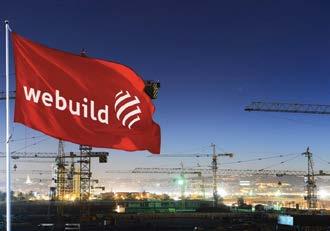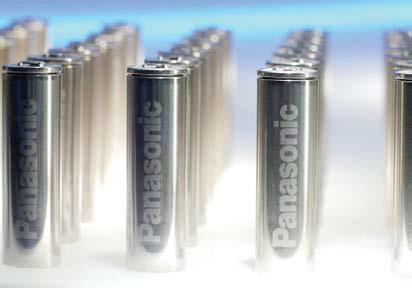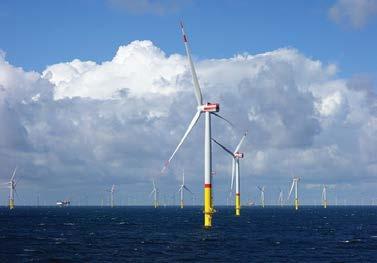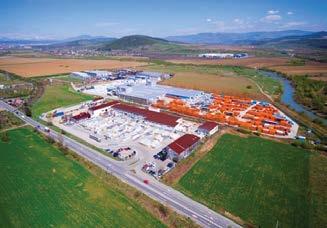
8 minute read
Linking up Combining strengths
NEWS
Combining strengths
Astaldi Acquistion By Webuild Completed
Italy’s biggest construction group, Webuild, has completed the acquisition of its 65% stake in Astaldi, a fellow Italian construction company which was recently on the brink of bankruptcy, in a deal worth €225 million.
The acquisition will establish Webuild - formerly called Salini Impregilo - as a major global player in the construction sector, with a backlog of orders totalling at over €40 billion.
Webuild first put its acquisition offer to Astaldi in February 2019. At that time, Astaldi was in the process of securing protection from its creditors so it could buy time to restructure. The embattled construction firm then submitted Webuild’s offer to the Court of Rome for approval.
The deal, which was accepted by Astaldi shareholders, creditors and the courts, saw the liquidation of some of the company’s non-core assets in order to pay off some debts to creditors. The shedding off these assets also allowed Webuild to take a controlling share in Astaldi without inheriting its debts.
These assets included its stake in the Gebze-Orhangazi-Izmir highway, and Etlik health campus, both in Turkey, and the Santiago airport and Felix Bulnes hospital in Chile.
According to Webuild’s own data, the construction sector represents 8% of Italy’s economy and employs half a million people. The company said that the investment will bring it “closer to what its foreign competitors enjoy: a strong presence in their home markets”.
The Astaldi acquisition was part of the ‘Project Italy’ plan, launched by Salini Impregilo in 2019. The aim of the project is to aid in the revival of the Italian construction industry through the creation of a single major construction hub.
Astaldi, which has completed major projects worldwide such as the Yavuz Sultan bridge over the Bosphorus in Istanbul, and the world’s largest optical telescope - the ELT - in Chile, is one of three companies acquired by Webuild as part of Project Italy.
As part of the project, Webuild is now in the process of taking control of Seli Overseas SpA and Grandi Lavori Srl, which owns GLF Construction (USA). visit: www.webuildgroup.com/en
Panasonic, Norsk Hydro, Equinor Consider “Green Battery” Plant In Norway
Japanese tech giant Panasonic is teaming up with two Norwegian companies, Norsk Hydro and Equinor, to explore the possibilities for establishing a European “green battery” business, with the continent’s automotive sector as potential customers.
In a press release, the companies said they “will work together towards summer 2021 to assess the market for lithium-ion batteries in Europe and mature the business case for a green battery business located in Norway.”
Despite having a stake in the world’s largest battery factory, along with Tesla in Nevada, Panasonic’s presence in Europe is somewhat limited. The company appears to be attempting to use its success as a Tesla supplier in the US as a springboard to gain new business from Europe’s automotive sector.
Demand for lithium-ion batteries is set to increase rapidly as more and more countries are setting dates for the phasing out of petrol and diesel cars.
Norway, which is heavily reliant on revenues from oil and gas, is aiming to become the first country to end the sale of fossil-fuel-powered cars, having set a 2025 deadline. Electric vehicle sales already account for 60% of new car sales in the country.
Locating the factory in Norway also comes with the advantage of a lowered carbon footprint as, despite being an oil and gas exporter, the country is almost entirely powered by renewable hydroelectric energy.
Mototsugu Sato, Executive Vice President of Panasonic, said the partnership with Norsk Hydro and Equinor was a superb opportunity for the company to expand in Europe.
“Panasonic has powered the last two revolutions in the automotive industry – first by powering hybrids and now, by powering multiple generations of all-electric vehicles. We are pleased to enter into this initiative to explore implementing sustainable, highly advanced technology and supply chains to deliver on the exacting needs of lithium-ion battery customers and support the renewable energy sector in the European region,” said Sato.
The size of the factory will depend heavily on the results of the six-month study. Some analysts have said it will be of a similar size to the Nevada gigafactory, which is soon to be upgraded to 38 gigawatt hours a year.
The Northvolt-owned factory in neighbouring Sweden, close to the Arctic Circle, is set to have a capacity of 34GWh by 2024, with the possibility of being upgraded to 40GWh.
Al Cook, Executive Vice President of Global Strategy & Business Development in Equinor, said: “We believe that battery storage will play an increasingly important role in bringing energy systems to net-zero emissions. By pooling our different areas of energy expertise, our companies will seek to create a battery business that is profitable, scalable and sustainable.”
The battery makes up around 40% of an electric car’s value, and the market is burgeoning. At present, China produces around two-thirds of the world’s batteries and the EU is eager to increase its own share from its current 3% up to 25% by 2028.
In December 2019, the European Commission gave the go-ahead to a funding package of €3.2 billion for research and development into battery technology as part of a push by Brussels to grab a share of the marketplace and become less reliant on imported batteries from China. visit: www.panasonic.com/global/home.html

LINKINGUP
Berlin & Copenhagen Agree Closer Offshore Wind Cooperation
Denmark and Germany pledged yesterday to cooperate more closely on offshore wind energy projects via clusters in the Baltic and North Seas, aiming to offer a boost to renewable power.
The cooperation is an important part towards reaching the goals of the EU’s offshore wind strategy, which is aiming for a Europe-wide 60 GW capacity by 2030 and 300 GW by 2050 - up from 12 GW today.
“What matters now is to identify concrete projects together with our neighbours and drive them forward,” said Germany’s energy minister Peter Altmaier.
He also stressed the importance of finding framework conditions that were of benefit to both Germany and Denmark, and to find synergies with green hydrogen development.
Earlier this month, Copenhagen announced plans for two clusters, adding 5 GW of offshore wind capacity by 2030 - three times the size of Denmark’s current offshore wind fleet - and marking the largest construction project in the country’s history.
The North Sea energy island would connect offshore wind farms with 3 gigawatt (GW) of capacity by 2030, potentially rising to 10 GW later, while a second island off the coast of Bornholm in the Baltic Sea would have a capacity of 2 GW.
These could be connected to countries other than Denmark via offshore grid connections.
As part of its offshore strategy, the European Commission proposed that power generation assets at sea should form their own electricity market bidding zones, which set the price of the production there. Read More: industryeurope.com/sectors/ energy-utilities/north-sea-s-biggest-windfarm-ready-for-operation/

Arkona offshore wind farm. Credit: Ein Dahmer / Wikimedia
Kingspan Acquisition Of TeraPlast Steel Firms Gets EC Approval
Romanian manufacturer of plastic construction products TeraPlast Group has said the European Commission has given its official clearance to sell off two of its steel businesses to Ireland-based Kingspan Group.
The Competition Authority approved the sale of TeraSteel and Wetterbest to Kingspan on January 12, according to a statement released by TeraPlast.
Another deal for a third company, TeraSteel Serbia, is still awaiting approval by the Serbian competition authority, which the group expects to receive in mid-February.
TeraPlast announced the €85 million deal for its steel business - which comprises the three distinct companies - in July 2020.
TeraSteel is the leading company in the production of sandwich panels on the Romanian market and along with its Serbian counterpart is one of Central and Eastern Europe’s top exporters. Wetterbest is the second-largest producer of metallic roof tiles in Romania.
Kingspan Group is a building materials company based in Ireland trading in 70 countries with 159 factories and employing over 15,000 people. The company is listed on Euronext Dublin and the London Stock Exchange.
The TeraPlast Group product portfolio comprises several business lines: installation, PVC joinery profiles, compounds, thermal insulating panels, windows, doors and metallic tiles. The group’s seven companies are TeraPlast SA, TeraSteel Romania, TeraSteel Serbia, Wetterbest, TeraGlass, TeraPlast Recycling and TeraPlast Hungary. Visit: www.kingspan.com/group/

Several Companies Band Together For Green Hydrogen Initiative
Seven companies, including ACWA Power and Iberdrola, have come together to set up an initiative to scale up production of green hydrogen within the next six years.
Hydrogen trains are one of many new technologies that green hydrogen could power.
The ‘Green Hydrogen Catapult’ initiative aims to provide 25 gigawatts of green hydrogen by 2026 and halve its current cost to around $2 per kilogram.
Reducing the price of green hydrogen to this level should make it competitive with other fuels.
Producing green hydrogen - which is generated through electrolysis - is currently far more expensive than harvesting it from natural gases.
The initial investment from the seven companies will come to around $110 billion (€82.5 billion), which will be raised through debt and equity providers with the option for some public funding.
Their targets would go a long way in aiding the complete decarbonisation of the world’s industries, as several companies in other sectors have begun to move away from traditional forms of fuel and energy.
Paddy Padmanathan, CEO of ACWA said: “Having led the race to deliver photovoltaic energy at well-below $2 cents per kilowatthour, we believe collective ingenuity and entrepreneurship can deliver green hydrogen at less than US$2 per kilogram”.
At the 2020 Global Manufacturing and Industrialisation Summit (GMIS 2020) it was hinted that green hydrogen could go a long way to reshaping global supply chains.
A Capgemini report from October considers it essential in helping the EU reach its climateneutral targets
Green hydrogen could also be used to power truck fleets, trains, and aircraft.










